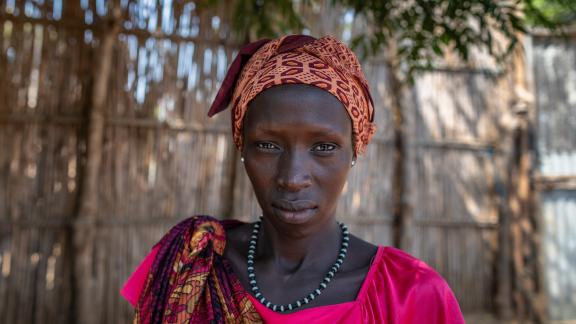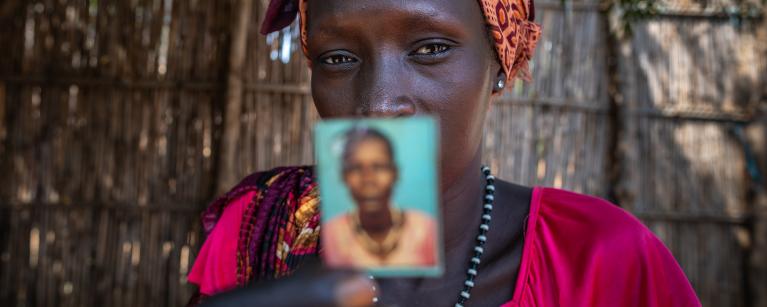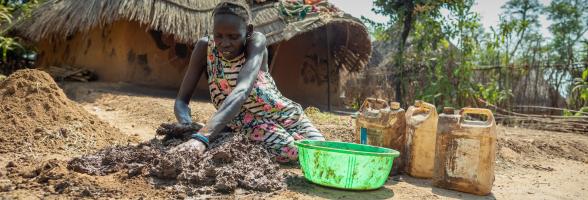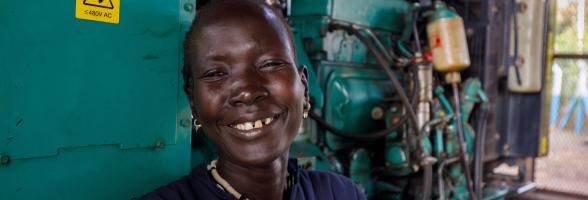“I left home due to the war, but the camp life is also very challenging. For one to live you need food and education, but those are the things that we don’t have here at the camp.”
In Tierkidi refugee camp, in Gambella, Western Ethiopia, 29-year-old Nyajany Gatwech prepares her routine trip to go to the market and buy vegetables that she sells to refugees from South Sudan. The business is helping Nyajany to buy food and clothes for her three children and three nephews that she lives with.
Like thousands at the camp, Nyajany was forced to flee her home in Malakal, South Sudan eight years ago with her children, nephews, and clothes on her back. They trekked for nearly a month from Malakal, Upper Nile state of South Sudan to the Ethiopian border town of Gambella facing hunger and conflict at every turn.
“The journey was not an easy one, I had small children, and I was alone since my husband stayed behind. Thank God we managed to get to the border safely” describes Nyajany .
Upon reaching Gambella, Nyajany and her family were registered at the Barbiyo registration center. They were soon resettled at Tierkidi Refugee Camp, nestled amidst the verdant landscape of Gambella, —a temporary respite from the horrors they had left behind. Yet, life in the camp is a harsh reality check, where survival depends on meager food rations from the aid organizations.

“I left home due to the war, but the camp life is also very challenging. For one to live you need food and education, but those are the things that we don’t have here at the camp. Food is never enough and at times we eat once a day until the next day.” she explains.
Nyajany explains that the lack of food is increasing insecurity at the camp with people stealing things to sell to get food. Desperate to improve her family’s situation, Nyajany sold her smartphone which she brought over from South Sudan to a member of the host community in Gambella.
“I got a little bit of money from selling my phone and used that money to buy vegetables from the host community, I then bring them back to the camp and sell them to the refugees at the camp who can’t walk long distances to the market. This has helped support me with food and clothes for my family” added Nyajany
However, despite some sort of semblance of stability, Nyajany’s nephews always asked for the whereabouts of their mother. “I reached out to the Red Cross tracing program of my sister, I shared the only passport photo I had of my sister with my number, they managed to get her, she called me and we spoke. She promised to find us but that has not happened until now, I don’t know what has happened to her up to now” adds Nyajany
Reflecting on her life before the camp, Nyajany recalls a time of peace and stability. “Things are very different now,”
Roughly 375,000 refugees from South Sudan live in Ethiopia’s western Gambella Region—of this number 87% are women and children and 63% are under age 18.
Since 2014, Oxfam has been providing support to the refugees with clean water, sanitation, and hygiene as well as gender and protection services. Working with communities, Oxfam provides water by tapping into the nearby Baro River to supply and distribute treated water through a network of pipes to taps in the camps and neighbouring host communities. This is ensuring people like Nyajany have access to water but the lack of essential supplies like jerrycans and poor maintenance of water points, due to lack of funding, is hampering these efforts.
The increase in the refugee population, now also escaping the conflict in Sudan, and in host communities, intensified the pressure on the clean water supply system . This leads to the breaking down of essential infrastructure, while lack of funding makes the maintenance difficult and exacerbates the situation.
For Nyajany her hope extends beyond her own family's well-being. While she strives to provide the best for her family, her ultimate aspiration is to witness a better future for all in her community where necessities like food, clean water, and education are not just dreams but accessible realities.


